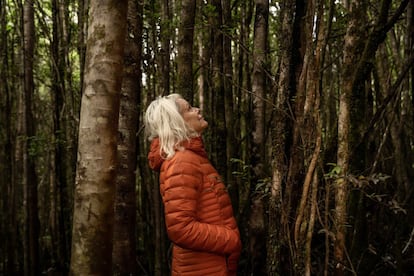Kristine Tompkins: ‘If a country declares an area to be a sanctuary and doesn’t protect it, this sets a terrible precedent for the world’
The American conservationist spoke with EL PAÍS about the documentary ‘Wild Life,’ which follows Kristine and her husband – entrepreneur Douglas Tompkins – in their efforts to preserve land in South America. She also discussed the new national park project in Magallanes, the southernmost region of Chile


Kristine Tompkins, 73, is back in her native country. After 28 years living in Patagonia, constantly travelling between Chile and Argentina, the conservationist decided to return to the United States for a while. In 2020 – at the beginning of the pandemic – she caught the last flight out of Chile before the borders closed. She hunkered down in Santa Barbara, California, the same town where she was born. Her home state was also where the outdoor recreation clothing company Patagonia began, of which she was the first CEO.
Three years have passed since she resettled in the US. While she has returned several times to the extreme south of the world since the pandemic, for now, she’s comfortable living close to her childhood friends and her three older brothers. She’s also accompanied by her English Labrador retrievers – she takes them for a walk every day, at five in the morning, before heading off to Pilates class and working on the computer. From her desktop, she monitors the progress of the Rewilding Project – the foundation formed by the Tompkins Conservation in Chile and Argentina.
Tompkins sits down in her living room for a video interview with EL PAÍS. It’s a spacious and comfortable room, with homey decorations and large windows that reveal a bit of her garden. Her routine has changed a lot, she acknowledges, since those hectic years in which she and her now-deceased husband, Douglas Tompkins – the founder of The North Face and Esprit Holdings – decided to leave everything to settle in southern Chile and dedicate themselves exclusively to environmental conservationism. There, they flew around the region in small planes, crossing the Andes and visiting the hundreds of thousands of acres of land that they bought to protect from industrial activities. Kristine always thought she would die on one of those trips, but it was Douglas who left her: in 2015, a kayak accident on General Carrera Lake ended his life, in the extreme south of Chile.
Their story – along with Kristine’s grief – was documented by Elizabeth Chai Vasarhelyi and Jimmy Chin for National Geographic. The film – Wild Life – premiered this past March. It has since been streamed on the Disney+ platform.
The conservationist wasn’t keen on telling such an intimate story on screen. In fact, it wasn’t until the premiere in Austin, Texas, when she saw the full film. She confesses that she didn’t like it the first time. “I’ve seen it like five or six times so far and I like it more each time,” she laughs.
Wild Life tells the story of how, following the death of Douglas Tompkins, Kristine continued her crusade to deliver – through the Tompkins Conservation – the conserved lands to the Chilean government, so that the property could be transformed into national parks, which are protected from extractive activities. Since 2004, the foundation has contributed to the formation of several national parks. In 2019, during the second administration of President Sebastián Piñera (2018-2022), the Tompkins Conservation completed the creation of the Pumalín Park – in the Los Lagos Region – and the Patagonia Park in the Aysén Region. This involved a gift of just under one million acres – the largest donation of private land in history. All of this territory is part of Ruta de los Parques, a scenic path that goes from the city of Puerto Montt – the capital of the Los Lagos Region – to Cape Horn, the southernmost point of land in the Americas. This massive parcel was created with the vision of turning tourism into an engine for local economies. The initiative also seeks to establish the National Huemul Corridor (CNH) – a shield for the South Andean deer, an endangered species.
Today, Kristine loses sleep over the Cape Froward National Park Project. This is an initiative that aims to create a new national park out of some 320,000 acres in the southernmost part of the continental mass of Latin America, in the Magallanes Region of Chile. About 231,000 acres will be donated by Rewilding Chile and the Tompkins Conservation, while close to 84,000 acres must be re-categorized by the Chilean state, in order for the parcels to be part of this protected territory.
The lands were purchased in 2021 by the foundation, in conjunction with nine Chilean and international philanthropists. Unlike the other projects they’ve embarked on, Cape Froward includes a coastal marine conservation component. “This is the first time that [we work] on the marine coast… it’s much more complicated,” Tompkins sighs.
President Gabriel Boric’s administration accepted the lands this past March. “Everyone was talking about this 36-year-old president and the constitutional change in Chile… the truth is that I didn’t know what to expect. Not everyone at that age can have the temerity and the ability to be elected as president of a country. It’s very rare. And it was only an [hour-long meeting with Boric], but it was very positive. I think he’s a very good listener, a good thinker. I think he has challenges which are up to the top of the roof. You know, trying to rewrite the Constitution, trying to keep the economy afloat, trying to address issues of education… he’s juggling all these things. I’m really impressed by him,” she affirms.
But Kristine Tompkins is also worried. The law that created the National Service for Biodiversity and Protected Areas – which the Chilean Congress approved on June 14 – ultimately didn’t include a controversial article, which would have prevented the renewal and granting of salmon-fishing concessions in marine protected areas. Demonstrations by workers in the salmon industry took place days before the law was voted on – the men and women were concerned about their jobs. While this activity is prohibited in national parks, it’s allowed on national reserves, multi-use conservation areas and Indigenous territory.
“Commercial operations and private extraction businesses within protected areas shouldn’t be allowed. What if they want to drill for oil in these areas? If a country declares an area to be a sanctuary and doesn’t protect it, this sets a terrible precedent for the world.” She clarifies that “no one is saying that [the businesses and workers] have to leave tomorrow… but when the concessions end, they shouldn’t be renewed. Nobody wants to take anyone’s job, nobody wants the people involved in the fishing business to suffer – I think they should have the support of the government – but if we make that argument at all times, if nothing is sacred, then we’re going to face a future in which we all suffer.”
While her opinions are strong, Tompkins does have friends in Chile who are, in fact, big businessmen involved in extractive activities. In fact, Bernardo Matte – part of the family that owns CMPC, one of the biggest pulp and paper companies in the world – appears in Wild Life during Douglas Tompkins’ funeral. His firm attempted to build five hydroelectric dams in the Aysén Region… a project that was scrapped in the second government of Michelle Bachelet (2014-2018).
Kristine laughs. “Yes, it’s ironic that we fight so much with Bernardo Matte and with other [Chilean] friends. But I think we’ve always been very honest with each other. After Doug’s death, I got so many calls and letters from people saying, ‘I fought with him so many times, we argued a lot, but I’m going to miss that voice in my head for the rest of my life, his insistence that we’re on the wrong track.’ And I think that’s the meaning of friendship based on honesty… [we had the ability] to debate each other. We always tried to convince them to be on our side, whether it was [on the issue of] dams or the salmon industry. And I thought: ‘What a beautiful way to speak of someone you disagreed with almost all the time!’”
When asked if she ever managed to convince any of her powerful Chilean friends, Kristine smiles. “Obviously not about the salmon. ‘Convincing’ is a very big word, but I think that, in the last 10 years, there have been big changes in how people think about the role of industries and nature. Now, how does that affect the decisions [these people] make? I don’t know. But I can tell you that no one we’ve met in the last 30 years has ever told us we were wrong.”
Sign up for our weekly newsletter to get more English-language news coverage from EL PAÍS USA Edition
Tu suscripción se está usando en otro dispositivo
¿Quieres añadir otro usuario a tu suscripción?
Si continúas leyendo en este dispositivo, no se podrá leer en el otro.
FlechaTu suscripción se está usando en otro dispositivo y solo puedes acceder a EL PAÍS desde un dispositivo a la vez.
Si quieres compartir tu cuenta, cambia tu suscripción a la modalidad Premium, así podrás añadir otro usuario. Cada uno accederá con su propia cuenta de email, lo que os permitirá personalizar vuestra experiencia en EL PAÍS.
¿Tienes una suscripción de empresa? Accede aquí para contratar más cuentas.
En el caso de no saber quién está usando tu cuenta, te recomendamos cambiar tu contraseña aquí.
Si decides continuar compartiendo tu cuenta, este mensaje se mostrará en tu dispositivo y en el de la otra persona que está usando tu cuenta de forma indefinida, afectando a tu experiencia de lectura. Puedes consultar aquí los términos y condiciones de la suscripción digital.








































